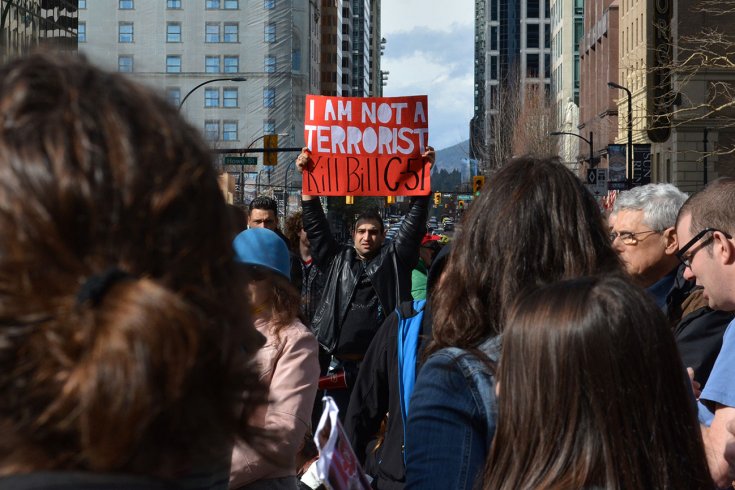Bill C-51, the Harper government’s recently proposed “Anti-terrorism Act,” restructures our national security laws so extensively that it will take years before we understand the law’s full effect. There is good in the act, but there also is bad, and even truly ugly. The details are difficult for non-experts to navigate. That is why we are providing Walrus readers with this summary.
The Good
Let’s start with what’s good in Bill C-51. First, we applaud the overarching fact that security issues in Canada continue to be addressed by law, and not through use of extrajudicial government power. Not so long ago, this would have been a peculiar thing to acknowledge. But in light of developments elsewhere in the world —such as the post-9/11 United States, where many anti-terror measures have not been specifically authorized by democratically enacted legislation—it is an important aspect to note. Whatever else may be said about Bill C-51, its provisions are all laid out in black and white for pundits and opposition politicians to scrutinize.
Second, we should welcome the government’s efforts to put certain important programs—such as Canada’s so-called “no-fly” list—on firmer legal footing. That list has existed for some time, but was cobbled together on the basis of a slender statutory basis with inadequate checks and balances.
Third, we are prepared to be convinced that the country will be well-served by terrorism “peace bonds,” under which police will be allowed to limit the liberty of someone if they have reason to believe he or she might be about to commit a terrorism-related crime.
We hold a similar view on Bill C-51’s provisions relating to preventive detention. Under the expanded anti-terror regime contained in the law, investigators who are concerned that a plot “may be carried out” will be empowered to detain suspects for as long as seven days (up from three days, as per the current law). We can imagine circumstances under which such a provision becomes a necessary evil. But we believe that that this necessary evil needs to be closely constrained, and carefully overseen.
Moreover, the government’s sketchy explanations—especially the lack of explanation regarding Martin Couture-Rouleau, the Quebec Muslim convert who was well-known to police at the time he drove his car into two Canadian soldiers last October—leave us with little understanding about why the present system is inadequate.
The Bad
Whatever our general views on preventive detention, we are concerned whether seven days of detention will equate to seven days of protracted and aggressive interrogation. Abusive interrogation is one of the hallmarks of the post-9/11 world. And we must be vigilant to ensure that it does not come to Canada by way of Bill C-51.
One should not assume the state will visit abuse on detainees. Nor do we assume that the courts would be inattentive to this matter. Canadians would be naive, however, to assume that some investigators will not take advantage of a week-long detention period to browbeat a suspect. Safeguards should be added to this legislation, including limitations on the total number of hours a person may be interrogated (as well as the circumstances of the interrogation).
Nor should one assume that the “right person” always will be detained: There will be false positives, innocent people wrongly placed into custody. This is especially so in a system that allows the state to detain so easily, combined with cases where the boundaries of a suspected cell or group are unclear. Many Canadians may be vulnerable to detention based merely on the fact that their name appears on a terror suspect’s cell phone call list.
We also are concerned by the bill’s new information-sharing regime, which dramatically loosens the strictures on how the government internally shares data, and introduces a dangerously broad category of “activities that undermine the security of Canada,” which can include much illegal protest. This will be of special concern to anyone who has studied the infamous Maher Arar case.
The Ugly
Bill C-51’s prohibitions on speech that promotes or glorifies terrorism would provide sweeping powers to police and prosecutors—more vast than the government has acknowledged so far. Thankfully, courts may ultimately restrain that scope, either because judges interpret the provisions narrowly, or because (as seems likely) they consider the provisions to infringe on Charter rights to free speech.
In the meantime, the speech provisions of Bill C-51 will cast a chill on any opinion touching upon the issue of terrorism—including opinions that are politically extreme and irresponsible, but that are far removed from actual or threatened terroristic violence. Those opinions will not disappear, of course. They will persist in secret, renewed by a sense of grievance. The more attentive holders of these views will go silent, especially on social media. This important open-source form of intelligence—on, particularly, al Qaeda- or ISIS-inspired radicalization—may degrade. And our most promising response to violent extremism—community-based programs such as the RCMP’s new counter-extremism initiative—may prove less successful, since they rely on open and candid communication with those who harbour radical views.
The bill’s authors don’t seem to appreciate the extent to which speech already is criminalized under existing terror laws. One person was successfully prosecuted in 2010 for outright terrorist propaganda. And last month’s arrests of three men in Ottawa, under provisions of the 2001 anti-terror law brought into effect in the months after 9/11, reaffirms that conduct that amounts, in a large degree, to speech can be prosecuted under existing legislation. We are hard pressed to see any virtue in going one step further, and prosecuting the more general, abstract form of expressed pro-terrorist sentiment that the language of Bill C-51 would cover.
The law will also allow the state to censor the internet and seize “terrorist propaganda” tied to this new, broad offence. We are not opposed to judicial orders to delete material from the Internet that incites terrorism, and as such is already criminal. But we do have concerns about the breadth of “terrorist propaganda” and what it will mean for expression of unpopular (and even popular) ideas, only distantly linked to possible violence. We have even more concerns that customs and border control will be allowed to enforce this new provision in deciding what material enters the country.
But it is the proposed changes to Canadian Security Intelligence Service that are the most radical feature of the bill. CSIS was designed with a broad mandate but limited powers. Until now, it has been an intelligence service—which is to say that it collects and analyses information, and supplies threat assessments to the government. When it was created in 1984, parliament approved CSIS’s mandate as one that excluded “kinetic” powers—including the power to arrest or otherwise do things to people in the physical world (except when necessary, for example, to install a wiretap or listening device).
That will change under Bill C-51—although some of CSIS’s new “kinetic” powers will be mild or innocuous. CSIS, for instance, will become able to intervene by talking to parents of a radicalized youth. CSIS also will become able to meddle with property in order, for example, to swap out an explosive chemical for an inert one.
But why must it be CSIS that performs such actions and not, as has been the case in the past, law enforcement including the RCMP? And how will CSIS’s involvement affect the government’s ability to transfer secret intelligence into evidence that can be used in court?
Another problem is that the proposed bill does little to limit CSIS’s kinetic powers to the sort of benign activities described above. All we get in Bill C-51, in this regard, is the stipulation that CSIS agents will commit no bodily harm, no obstruction of justice, and no violation of sexual integrity.
These three items are a cut-and-paste job from Criminal Code provisions that authorize the police to, in limited circumstances, violate the law if officers abide by such stated conditions. But the analogy is imperfect. When the RCMP breaks the law in the course of a police investigation designed, ideally, to result in criminal charges, that behaviour will be tested in open court. When the system works as intended, everything comes to light, and police misconduct scuttles prosecutions.
CSIS, however, faces no such prospect. Its activities come to light only when something goes seriously wrong, or when its investigations morph into criminal processes led by the RCMP.
Bill C-51 does superimpose a special warrant system on CSIS’s new kinetic powers: Where those activities would violate either a law or the Charter of Rights and Freedoms, a Federal Court judge must bless them in advance. But that, too, is problematic.
The obvious thinking is that such a system simply builds on the conventional role of judges in issuing search warrants. However, here again, the analogy is approximate. In the world of search and seizure, judicial warrants are designed to prevent—not authorize—Charter violations. That is because the Charter privacy protection is qualified: the Charter protects against “unreasonable” searches and seizures, and any search under a warrant is prima facie proper. “Unreasonable,” in this context, typically means without warrant.
But other Charter rights—including those endangered by CSIS’s broadened powers—are dramatically different. For instance, there is no concept of “reasonable” cruel and unusual punishment under the Charter: it is an absolute right. To imagine that a court can pre-authorize a violation of this right—as C-51 apparently would allow the court to do—is to fundamentally misunderstand the way our constitution works.
Here we get to a major conceptual problem with C-51: Section 1 of the Charter allows rights to be invaded where such invasion is “reasonable” in a free and democratic society, but only when “prescribed by law”—which usually means specified by statute—on top of being justified by a rigorous legal test. A judge who is presented with a warrant application from CSIS is in no position to invent a new exception to a Charter right. Which is to say: Nothing in our constitutional tradition suggests that a judge is competent, by warrant, to “prescribe by law” a Section 1 Charter exception on an ad hoc basis.
This aspect of our critique may sound obscure. But the ramifications are enormous. Bill C-51, if passed, would allow Federal Court judges to limit all sorts of Charter rights, including the right of Canadian citizens to return to Canada. What’s worse, there is no guarantee that such judicial decisions will be made public, given the need for secrecy in terror cases.
Moreover, there would be no democratic discussion. The British Parliament is having a debate over the validity of exclusion orders that keep citizens who have joined ISIS from coming back home. We are not having such a debate, because our parliament is being asked to sign a blank cheque for Charter violations under C-51’s new CSIS warrant scheme.
We could be wrong in our appraisal of how courts will construe these powers. But we won’t know for certain, because any deliberation on this question will be conducted in a warrant proceeding. In other words, all these weighty legal deliberations will be done in secret, with only the judge and the government side represented. The person affected by the illegal activity will not be there, nor likely will ever know what government agency visited the misfortune upon them.
They cannot defend their rights. No civil rights group will be able to weigh in on their behalf. The overall results, we fear, will be an opaque parliamentary debate on the merits of this law followed by a one-sided legal discussion about its application.
At best (the bill does not guarantee this, but we expect courts may do this on their own initiative), the public interest will be defended by a “special advocate.” This is a representative who must try to balance such advocacy work with his or her private legal practice. He or she will be paid a fraction of his or her regular billing rate, will be sworn to secrecy, and made unable to consult often with other special advocates—while, most likely, fighting tooth and nail to ensure that the government is candid. There is no equality of arms in such proceedings.
Shelves already groan with review body reports and Federal Court decisions complaining that CSIS has distressingly, regularly failed to meet its duty of candour in closed-door proceedings. It is difficult to know whether these reports are the tip of the iceberg—a failure to be candid is hard to detect.
The ultimate court decision in such cases generally will not be made public, typically because of concerns that disclosure would reveal and affect adversely ongoing intelligence operations. And there will be no one in a natural position to appeal the decisions. We risk the creation of what is in effect an entirely secret, Kafkaesque body of jurisprudence concerning when CSIS can act beyond the law.
Our expectation is that the Federal Court will do its best to push out redacted versions of its cases, but it will be inventing the process as it goes. Appeals, if any, will depend on ad hoc arrangements, and presumably also require an earnest special advocate with the time and inclination to press matters and involve themselves in endless novel legal disputes (including the question over whether they can actually receive remuneration for bringing an appeal in these matters).
What might all these new powers (court-approved or not) mean for criminal investigations, if CSIS’s new kinetic powers muddy the waters of everyday police work? Will there be viable prosecutions rendered non-viable because CSIS’s undercover activities end up being intertwined in the defendant’s allegedly criminal conduct? We would be shocked if these questions are not deeply preoccupying the RCMP—bearing in mind the historically difficult relationship between CSIS and the RCMP.
With the exception of police bonds and preventive arrests, the government’s legislation package may, in some ways, actually make things ore difficult for the Mounties and prosecutors. Good defence lawyers will demand full disclosure of CSIS disruption and law-breaking activities, making open-court terrorism trials—long and complex to begin with—even more difficult. The Supreme Court already has reminded trial judges that they must permanently halt terrorism trials if they have a doubt that a fair trial is possible.
The Truly Ugly
We have nothing but respect for those who work with the Security Intelligence Review Committee, the independent, external review body that reports to parliament on CSIS operations. But SIRC is an underfunded, understaffed review body. Its statutory powers have not kept pace with the expanded power and mandate of the security services it reviews.
In 2006, the Arar Commission underscored the urgent necessity of new legislative tools allowing SIRC to coordinate with other review bodies. But even now, the review bodies are “stovepiped” by agency. Informal efforts to coordinate are rebuffed by the government. As we understand it, the government even has suggested that coordination would violate Canada’s criminal laws governing secrecy.
SIRC needs more money, more people, and a more credible process of appointing committee members. It also requires a renewed government mandate, recrafted to reflect the emerging reality recognized years ago by the Arar Commission.
Not everything in Bill C-51 is objectionable. Some provisions might even be welcome. But without a redoubled investment in our tattered accountability system, the overall package is an ugly one to anyone concerned about civil liberties, and should also provoke deep unease for those looking for a workable, rational approach to security.






